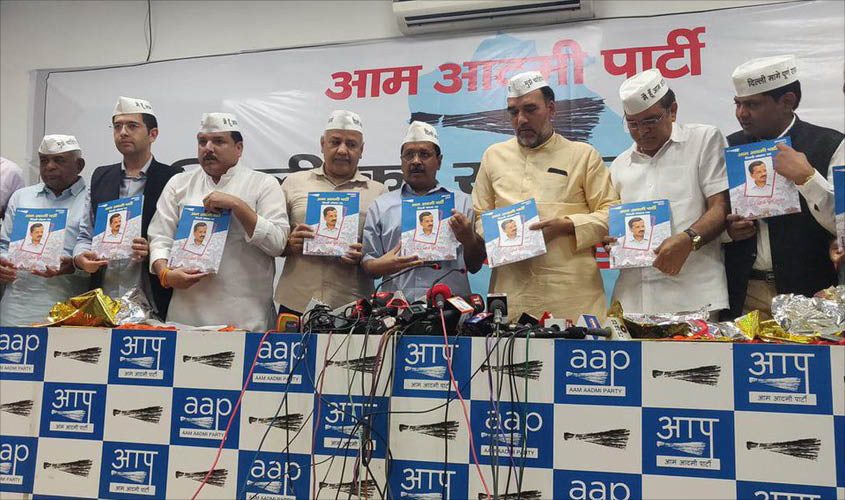New Delhi: Two key poll promises in the manifesto of the Arvind Kejriwal-led Aam Aadmi Party (AAP)—full statehood for Delhi and reservation for Delhi’s students in educational institutions like Delhi University—haven’t seemed to have gone down well with many voters in the capital as they have accused Kejriwal of promoting “jingoistic politics”. In its poll manifesto, AAP has offered a host of promises ranging from reservation for Delhi’s students in DU’s colleges, healthcare, housing, electricity, education, safety of women, to stopping sealing, but all the promises are conditional to full statehood for Delhi.
Dr Pravesh Kumar, assistant professor at Jawaharlal Nehru University, told The Sunday Guardian: “AAP’s manifesto has a host of promises, but with a condition. If Delhi gets full statehood, then AAP would fulfill its promises that the party has made in its manifesto. In case Delhi fails to get full statehood, AAP should not be held responsible for not meeting any of its poll promises. In my view, the party is running a bizarre campaign on the false assumption that Delhi cares too much about having a full statehood status.”
“I am not able to understand how, even if all of AAP’s candidates in Delhi are elected in the Lok Sabha polls, these seven MPs will get full statehood for Delhi? In any case, I don’t see a chance of Delhi becoming a full state in the near future,” Kumar said.
“The second promise of AAP—about reservation to Delhi residents in educational institutions like DU—is a jingoistic move of the party. Tell me how a capital can bar students coming from across the country to avail good education. And to even think that a Central university like DU should have reservation! The newly formed party is desperate to get power by using all means that one expects from a traditionally jingoistic party,” Kumar said.
Sanjeev Kumar, a student of DU, said:“We don’t want a debate on a full state or half state as we don’t care much for the same. What we care about is easy transportation, economic Metro fare, opening of new colleges, and grant of scholarship. Every day, we spend around Rs 200 to travel to colleges and return to home.”
Anil Kumar Singh, a student from DU, told The Sunday Guardian: “I came from Bihar and got an admission in DU. Does Kejriwal’s AAP want that I shouldn’t have come here to pursue my study in DU? Then, where should we go, Canada or US? We understand the jingoistic politics going on in our country. A party is seeking votes on the name of war, religion and communal divide; another is in fray with caste politics. Frankly speaking, I voted for AAP twice in the last Assembly and Lok Sabha polls, but now I have realised that the party has gone too far away from its main ideas.”
Ranjit Sharma, another DU student, told The Sunday Guardian: “No doubt the elected government in Delhi has limited powers and our cities are being governed by a messy system in place, but AAP’s reservation promise will not add any value to it; instead, the move will fuel regionalism in the capital. Delhi is a cosmopolitan city and voters from Bihar, Uttar Pradesh, South Indian states and Bengal all have voted for AAP. If AAP continues to use this plank, the party will be voted out from power soon.”
Shraon, a research scholar from DU, said: “Thousands of students from the NCR and also from other states study in colleges of Delhi. Promising reservation for Delhi’s residents will deprive the opportunity of getting higher education in the capital for lakhs of outside students. The fundamental issue is that successive state and Central governments have failed to open any new college in the capital in the last three decades.”

